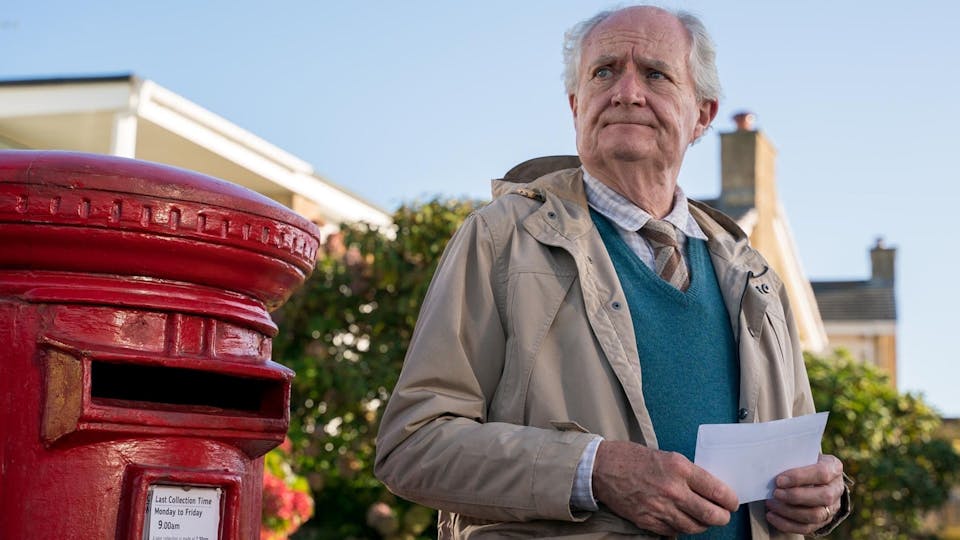
The Unlikely Pilgrimage Of Harold Fry Review
Think of British cinema and Jim Broadbent’s face might spring to mind pretty quickly. From one of Mike Leigh’s mainstays to Potter and Paddington via Bridget Jones, he’s quietly become one of the UK’s most exported faces. After playing the lead in 2022’s endearing Ealing comedy-esque The Duke opposite Helen Mirren, he’s paired with Penelope Wilton in another eccentric British affair aimed at the senior citizen audience: The Unlikely Pilgrimage of Harold Fry. Unlike The Duke, however, Harold Fry isn’t based on a remarkable true story, but a beloved bestselling novel by Rachel Joyce (who also adapted it for the screen).

Broadbent's Harold sets off — to his wife’s consternation — in his hopelessly inadequate deck shoes on this secular-but-spiritual mission from Devon to Berwick-Upon-Tweed to keep Queenie Hennessey alive. Inevitably, the people he encounters along the way irrevocably change him, from the Slovakian cleaner who bandages his bleeding feet to the idealistic teenage boy who reminds him of his estranged son. He accidentally goes viral and, Forrest Gump-style, inspires a movement of followers urging him on. Maureen, meanwhile, is angry and bereft, eclipsed by his sudden devotion to Queenie.
Director Hettie Macdonald first made her mark in 1996 with queer classic Beautiful Thing and recently helmed half the episodes of Normal People. Bolstered by solid performances from Broadbent and Wilton, she barely manages to elevate a cloyingly sentimental narrative and a script where every character is unrealistically direct (since when did any British character openly state their feelings?). Cinematographer Kate McCullough (The Quiet Girl) also does her best to keep things grounded, pursuing Harold along motorways as well as rolling hills, and injects his traumatic memories of his son with a nightmarish quality thanks to stark spotlights illuminating these flashbacks. It’s hardly subtle, but Harold Fry manages a few snatches of pathos when it’s not trying so hard to pull on the heartstrings.
As twee as its title, Harold Fry probably won’t win over anyone immediately turned off by its premise. Broadbent and Wilton are as reliable as ever, but this tear-jerker mostly feels removed from real human emotion. It might inspire you to go for a nice walk, though.
Related News & Content
-

Use wp.media templates to create totally custom modal
Use wp.media templates to create totally custom modal,Following up on this answer I'm trying to determine how to create a modal with completely unique menu items/content than the media modal. If you add a new state you can add a new menu tab and hav... Tags: media modal stackexchange.com WordPress Development Stack Exchange -

Get post by tag
Get post by tag,I want to get several post by tag. So I try to use get_posts() function: <?php $args = array( 'numberposts' => '3', 'post_status' => 'publish', 'tag' => 'travel' ); $ Tags: functions posts query posts stackexchange.com WordPress Development Stack Exchange -

Elementor + ACF: How to insert dynamic JSON-LD formatted code into ACF field without sanitizing the script tag?
Elementor + ACF: How to insert dynamic JSON-LD formatted code into ACF field without sanitizing the script tag?,On a normal website, I am able to add JSON-LD structured data, such as below, into a Elementor HTML widget, in a proper way. However, as soon as I insert JSON-LD format into an ACF field (Textarea)... Tags: advanced custom fields php stackexchange.com WordPress Development Stack Exchange -

Gutenberg InnerBlocks noallowedblocks on parent but allowedblock on Child
Gutenberg InnerBlocks noallowedblocks on parent but allowedblock on Child,This is a continuation of the following post: Custom Gutenberg block with nested InnerBlocks renderAppender not displaying add button I solved one problem but created a different problem. I'm recr... Tags: block editor plugin development stackexchange.com WordPress Development Stack Exchange -

Delay Issue: Using Wget with JSON Endpoint – Need Help Understanding Headers
Delay Issue: Using Wget with JSON Endpoint – Need Help Understanding Headers,On a WooCommerce website, I have a REST endpoint created with register_rest_route that returns a JSON response. To perform a routine with a certain frequency and urgency, I have added this instruct... Tags: rest api stackexchange.com WordPress Development Stack Exchange -

How do I change top header background color
How do I change top header background color,Please refer to website: https://virginiafrank.com I cannot get the top header background color (or phone numbers) to change color. I would prefer the background gold and text black. I can't make t... Tags: headers stackexchange.com WordPress Development Stack Exchange -

How to display the_tags() as plain text
How to display the_tags() as plain text,the_tags by default is displaying as URL. I need to display it as plain text to insert inside HTML attribute. <?php $tag = the_tags(''); ?> <div class="image-portfolio" data-section... Tags: stackexchange.com tags WordPress Development Stack Exchange -

Give to site admin the option to "skip confirmation email" when adding new user
Give to site admin the option to "skip confirmation email" when adding new user,in wordpress multisite when we give to site admin the option to add new users, site admin dont have the "checkbox" to add the new user without sending the user email with link activation (see the Tags: email verification multisite stackexchange.com users WordPress Development Stack Exchange -
Facing Hamas and Tehran, Israel is left with only vengeful madness | Opinion
Facing Hamas and Tehran, Israel is left with only vengeful madness | Opinion,Despite the Terrible Disaster on October 7, and the Failures It Exposed, Israel Is Still Convinced That the Image of the Mad Man Will Ensure Its Security -

Carol Kirkwood stuns in figure-hugging dress amid BBC Breakfast technical chaos
Carol Kirkwood stuns in figure-hugging dress amid BBC Breakfast technical chaos,CAROL Kirkwood stunned in a figure-hugging dress amid a technical blunder. BBC Breakfast was flung into chaos this morning after a string of sound issues. However Carol, 61, was all smiles as she p… Tags: BBC BBC Breakfast BBC ONE Carol Kirkwood mirror.co.uk The Scottish Sun TV News TV UK daytime TV -

Families ‘to sue prison’ where loud inmates ‘terrorise kids’ with screaming
Families 'to sue prison' where loud inmates 'terrorise kids' with screaming,Residents living next door to a new prison who say their kids have to sleep wearing headphones and some leave during weekends due to the racket are threatening to sue the prison service Tags: mirror.co.uk Neighbours from hell prisons Scottish government The Mirror -

Doctor Strange’s Secret Wars Role May Be More Important Than You Thought – Looper
Doctor Strange's Secret Wars Role May Be More Important Than You Thought - Looper,According to entertainment leaker Alex Perez, Doctor Strange will find himself confronting his inner struggles as he headlines "Avengers: Secret Wars." Tags: Fiction Looper looper.com Marvel Cinematic Universe Science Star Wars The Universal Monsters franchise -

‘It’s too revealing for a wedding’ people say as guest shares her dress with cut-outs & plunging neckline
‘It’s too revealing for a wedding’ people say as guest shares her dress with cut-outs & plunging neckline,A WOMAN has been mocked after sharing the summer dress she was considering wearing to nuptials. Attending someone’s big day can be just as stressful as organising the wedding ceremony –… Tags: Body Shapes events and attractions personal celebrations and life events style and fashion The Sun the-sun.com wedding Wedding Dresses Weddings womens clothing womens fashion -

Carl Weathers dead at 76: Rocky and Happy Gilmore actor mourned by family after dying ‘peacefully in his sleep’
Carl Weathers dead at 76: Rocky and Happy Gilmore actor mourned by family after dying ‘peacefully in his sleep’,ACTOR Carl Weathers has died at 76. Weathers, whose career spanned film and television, action and comedy, is best known for his role as Apollo Creed in the Rocky franchise, as well as his performa… Tags: Celebrity Celebrity Deaths cinemas and events comedy tv events and attractions Movies Pop Culture Showbiz Television The Sun the-sun.com -

‘What Jennifer Did’: Netflix doc explores shocking Ont. murder-for-hire case
'What Jennifer Did': Netflix doc explores shocking Ont. murder-for-hire case,Most of Jennifer Pan's entire life was made up of lies. When her parents began to catch on, she decided to bring in hired hitmen. Tags: Crime Entertainment Global News globalnews.ca Jennifer Pan jennifer pan now Trending What jennifer did what jennifer did netflix -

What’s behind the lack of enthusiasm for this year’s music festivals?
What's behind the lack of enthusiasm for this year's music festivals?,The public sentiment about this year's crop of music festivals is an overwhelming "meh." There are good reasons for this. Tags: Coachella Entertainment glastonbury Global News globalnews.ca lollapalooza Music festivals News -

Harbor Park Homecoming: Hampton Roads Cavaliers return to place where baseball dreams began
Harbor Park Homecoming: Hampton Roads Cavaliers return to place where baseball dreams began,Virginia Beach's Ethan Anderson, Chesapeake's Harrison Didawick, Norfolk native Cullen McKay, and Williamsburg's Luke Hanson made their return to Hampton Roads in Tuesday's loss to ODU. Tags: college medpagetoday.com News 3 WTKR Norfolk page Sports -

Admirals treat fans to win in first home playoff game since 2014
Admirals treat fans to win in first home playoff game since 2014,In the first playoff game the Admirals have hosted in a decade, the team did not disappoint, as an energetic crowd watched Norfolk shoot its way to victory. Tags: medpagetoday.com News 3 WTKR Norfolk Norfolk page Sports
Warning: file_get_contents(https://www.scienceradars.com/wp-output-content.php?pg=1&cat=&kw=&lvl=): Failed to open stream: HTTP request failed! HTTP/1.1 526 in /home/wwwroot/xuenou.com/wp-content/themes/chromenews/template-parts/content.php on line 169
Warning: file_get_contents(https://www.bayuexiang.com/wp-output-content.php?pg=1&cat=&kw=&lvl=): Failed to open stream: HTTP request failed! HTTP/1.1 526 in /home/wwwroot/xuenou.com/wp-content/themes/chromenews/template-parts/content.php on line 173
TrendRadars
The Most Interesting Articles, Mysteries and Discoveries

New Jersey first lady Tammy Murphy suspends her Senate campaign to replace indicted Sen. Menendez

Hands-on opportunities for teens offered at Extension 4-H Agriculture Symposium at UMaine

Oath Keepers’ son emerges from traumatic childhood to tell his own story in a long shot election bid

Katahdin Bankshares Corp. reports first quarter 2024 results




























































